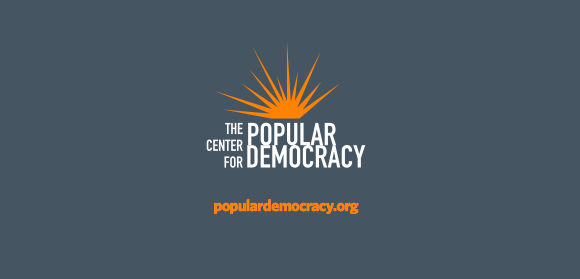Today the Center for Popular Democracy is releasing the report State Takeovers of Low-Performing Schools: A Record of Academic Failure, Financial Mismanagement & Student Harm. The report is an important compendium of information about hostile state takeovers of urban schools. The Center for Popular Democracy is,
a high-impact national organization that builds organizing power to transform the local and state policy landscape through deep, long-term partnerships with leading community-based organizing groups nationwide.
They work to,
create equity, opportunity and a dynamic democracy in partnership with high-impact base-building organizations, organizing alliances, and progressive unions. CPD strengthens our collective capacity to envision and win an innovative pro-worker, pro-immigrant, racial and economic justice agenda.
I was asked by the Center for Popular Democracy to write a forward for the report.
Politicians have recently focused on implementing policies to create achievement districts in cities across the country. These are districts populated by schools which are privately controlled, yet operated with public money. Achievement districts are a highly contentious, top-down down policy that essentially amounts to a hostile state takeover of local schools. In Detroit and Tennessee, achievement districts have initially impacted only a minority of schools. However, politicians are now trying to close entire districts and turn them over to privately controlled charter corporations—an approach similar to the market-led New Orleans takeover model. Top-down education “reformers” have also approached Dallas, and more recently Los Angeles, with a set of all-encompassing charter takeover plans.
Top-down education reformers have argued that students and parents should receive relief from low-performing schools. They argue that turning schools over to privately controlled charter organizations will enable school “choice” and improve educational outcomes. Does this view truly reflect reality, or is it an inaccurate and oversimplified political framing?
Thorough research and realistic data should inform our discussion about achievement districts. The report State Takeovers of Low-Performing Schools: A Record of Academic Fraud, Financial Mismanagement and Student Harm presents an alternative empirical view by collecting information from a variety of sources. The report succinctly makes the case that achievement districts have, in fact, performed poorly. The majority of data currently available demonstrates that achievement districts result in decreased student achievement with disproportionately harmful impacts on students of color, while parents still don’t have access to properly resourced high-quality neighborhood schools.
As a result, it seems clear that we must consider alternatives to the top-down state takeover approach for improving schools. It is incumbent upon us to think about community-based solutions that don’t ignore the needs that students bring to schools and the severe inequities that still plague schools located in communities of color. This report is especially valuable because it re-emphasizes the need for a culturally relevant and challenging curriculum, high quality teaching, wraparound supports, positive discipline practices, and transformational parent and community engagement. As an alternative to top-down, privately controlled state takeovers, we must get serious about investing resources in these community-based, democratic approaches to education reform.
What are the Findings?
The rapid proliferation of the takeover district as an educational panacea is alarming. In this report, we examine the record of the three existing takeover districts, and find that there is no clear evidence that takeover districts actually achieve their stated goals of radically improving performance at failing schools. We find that:
1. Children have seen negligible improvement—or even dramatic setbacks—in their educational performance.
2. State takeover districts have created a breeding ground for fraud and mismanagement at the public’s expense.
3. Staff face high turnover and instability, creating a disrupted learning environment for children.
4. Students of color and those with special needs face harsh disciplinary measures and discriminatory practices that further entrench a two-tiered educational system.
What are the Recommendations?
Instead of replicating failed statewide takeovers in an attempt to turn around struggling schools, states should pursue tested measures endorsed by educators, students, and community members, and that have been borne out by precedent. States must commit to improving outcomes at struggling schools through programs and policies that reflect the six key principles developed by the Alliance to Reclaim Our Schools. As articulated in The Schools Our Children Deserve, school turnaround strategies should focus on:
• Curricula that are engaging, culturally relevant and challenging;
• High quality teaching rather than high-stakes testing;
• Wrap-around supports such as health care, eye care, and social and emotional services that support academics;
• Positive discipline practices such as restorative justice and social and emotional learning supports;
• Transformational parent and community engagement—the full community should actively participate in planning and decision-making; and
• Inclusive school leadership committed to developing strategic plans that include authentic input from teachers, parents, community partners, non-instructional school staff, youth, and other stakeholders.
You can view the report here.
Please Facebook Like, Tweet, etc below and/or reblog to share this discussion with others.
Want to know about Cloaking Inequity’s freshly pressed conversations about educational policy? Click the “Follow blog by email” button on the home page.
Twitter: @ProfessorJVH
Click here for Vitae.


Did PopularDemocracy take down their info on the publication? I can’t find the original document at their site…
LikeLike
It moved. I’ll put up the new link.
LikeLiked by 1 person
Thank you.
LikeLike
Aloha, I am a 1970 graduate of Cal State Sacramento. They are fortunate to have you there. I really appreciate the material you bring to my attention. The world is better for your presence.
LikeLike